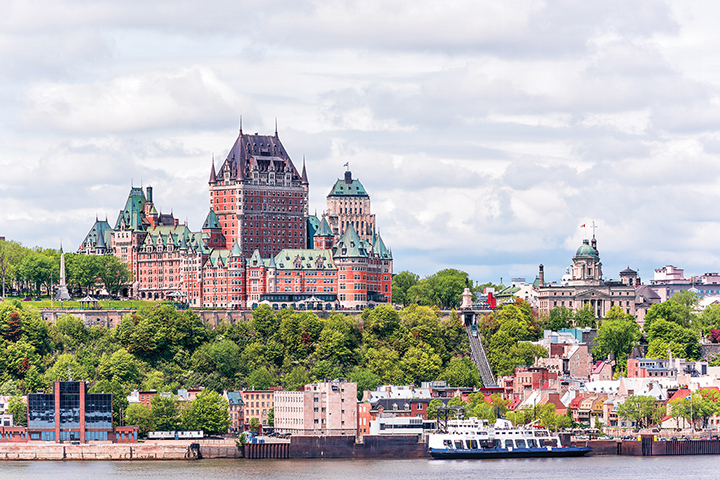Quebec’s Muslims Face Greatest Civil Rights Challenge of This Generation
By Steven Zhou
Sep/Oct 2024

It might not feel like it, but Quebec’s Muslim community is facing a political crisis that’s striking at the heart of Canadian democracy.
It hasn’t generated many headlines. Not many cameras or reporters arrived when the National Council of Canadian Muslims (NCCM) and the Canadian Civil Liberties Association (CCLA) took their fight against Quebec’s Bill 21 to the nation’s Supreme Court in April this year.
Stephen Brown’s (CEO, NCCM) impassioned speech at the courthouse’s steps implored Canadians to pay attention that, according to him, “we are facing the greatest challenge to Canadian democracy of our generation.”
Bill 21 was passed in 2019 by Quebec’s governing Coalition Avenir Quebec (CAQ), a nationalist, autonomist and conservative provincial political party. This law bans any public servant from wearing religious symbols at work — hijab, kippah, turban, crucifix and other religious attire. That also goes for anyone working in the Quebec public sector: police, teachers, prosecutors and so on.
Don’t want to take off your hijab in public at work? Too bad. Work somewhere else. This forces people of faith to pick between career and religious devotion. Some have lost their jobs; others have moved away.
Now, those who have had anything resembling a decent civic education will tell you that Canadians can challenge laws they consider unfair and that violate the rights, liberties and principles enshrined in the Constitution. Bill 21 is a prime candidate for getting sued, because it violates Quebecers’ right to religious freedom and expression, something that the 46-year-old Charter guarantees. Thus, Bill 21 shouldn’t be able to withstand a court challenge.
But that’s where the larger problem starts. CAQ, predicting that Muslims and other civil liberty organizations would work together to dislodge the bill through just such a legal or constitutional challenge, set a deadly precedent for democracy by invoking the Charter’s Notwithstanding Clause [NWC], or Section 33, to shield Bill 21 from being challenged.
Clauses, Courts and the Constitution
This clause exists as an emergency clause, as a kind of backstop to appease some provinces that were worried about judges (who are unelected) having too much say over the laws they pass. In short, it was never meant to shield bad laws that run roughshod over Canadians’ rights, thus severely undermining democracy’s core. When CAQ invoked Section 33 to protect this clearly unconstitutional law, Canadian society and democracy changed overnight. Canadians are in unfamiliar waters.
The NCCM and CCLA have found creative ways to bring this issue to the courts, hoping to break CAQ’s precedent-setting move and striking down the bill. So far, these efforts have failed. Judges say that Bill 21 is indeed unconstitutional, but that it’s also protected by the NWC, which allows the national Parliament or a provincial legislature to pass an act that expressly declares that such legislation or any of its provisions “shall operate notwithstanding a provision included in section 2 or sections 7 to 15 [the fundamental freedoms, legal and equality rights provisions] of this Charter.”
The only other way to repeal the law would be for the Quebec legislature to vote it out in the future. A provincial government will have to gather enough political will to challenge it. Recent polls, such as the January 2022 poll carried out by Leger for the Association for Canadian Studies, have also shown a drop in popular support for the bill (Morgan Lowrie, “Poll suggests support for Bill 21 provision may have dropped in Quebec,” Jan. 16, 2022, CBC News).
The political field is still open for any post-CAQ government in Quebec to take on this fight.
No matter how you look at it, Quebec Muslims have yet again been put under the spotlight, this time in a battle that threatens to permanently undercut democracy. Just two years before Bill 21 became law, a gunman massacred six Muslim worshippers in the Quebec Islamic Cultural Centre. Instead of addressing the factors that have endangered and villainized the province’s Muslims, the community was made into political cannon fodder.
But it must not be forgotten that the problem is now much bigger. It’s a national and possibly constitutional crisis.
If provinces and politicians can damage our rights to religious freedom by using the NWC to pass unconstitutional laws, then none of our basic rights are safe. We now have a precedent that has knocked down the door for other political actors interested in undercutting our guaranteed rights like free speech, free assembly and free association.
This is an ugly possibility that many Canadians have yet to seriously examine or reckon with, as they are distracted and their ability to bear bad news is narrowing. Moreover, they haven’t all been paying attention as civil liberties and human rights groups have been toiling silently, day and night, against the Quebec government.
But it’s time to wake up. Muslims are at a crossroads. Either Muslim Canadians inside and outside of Quebec assemble to organize a final, cogent challenge against the deathblow to democracy in this country, or they all watch the system guaranteeing their religious freedoms fall in silence.
Steven Zhou is a content writer with The National Council of Canadian Muslims.
Tell us what you thought by joining our Facebook community. You can also send comments and story pitches to horizons@isna.net. Islamic Horizons does not publish unsolicited material.
